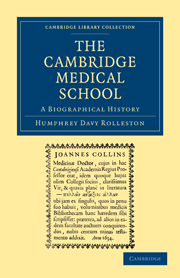Book contents
- Frontmatter
- Contents
- List of Plates
- Preface
- I The Medical School
- II Department of Anatomy
- III Department of Physiology
- IV Department of Biochemistry
- V Department of Experimental Psychology
- VI Department of Pathology
- VII Department of the Quick Chair of Biology
- VIII The Regius Chair of Physic
- IX John Caius
- X The Downing Chair of Medicine
- XI The Linacre Lectureship in Physic
- XII The Chair of Surgery
- Index of Persons
- Index of Subjects
- Plate section
IV - Department of Biochemistry
Published online by Cambridge University Press: 07 September 2010
- Frontmatter
- Contents
- List of Plates
- Preface
- I The Medical School
- II Department of Anatomy
- III Department of Physiology
- IV Department of Biochemistry
- V Department of Experimental Psychology
- VI Department of Pathology
- VII Department of the Quick Chair of Biology
- VIII The Regius Chair of Physic
- IX John Caius
- X The Downing Chair of Medicine
- XI The Linacre Lectureship in Physic
- XII The Chair of Surgery
- Index of Persons
- Index of Subjects
- Plate section
Summary
Sheridan Lea wrote the section on physiological chemistry in Foster's Textbook of Physiology and as University Lecturer on physiology from 1883 to 1896 dealt with that subject; this was carried on by A. Eichholz of Emmanuel College until a University lectureship in chemical physiology was established by Grace of June 12, 1898, and filled by the appointment of Frederick Gowland Hopkins, who in 1902 became Reader in that subject. In 1910 Trinity College added to this appointment a Praelectorship and a fellowship, and in 1914 the University elected him to the newly established professorship of biochemistry, tenable with the Readership and Praelectorship, but without any additional stipend. The Sir William Dunn Professorship of Biochemistry was established by Grace of February 12, 1921, and the previous chair of biochemistry was suppressed. This was endowed with £25,000 out of £165,000 conveyed to the University by the Trustees of the late Sir William Dunn.
The Department of Biochemistry was separately constituted in 1914; from 1908 the teaching was carried on in part of the old physiological laboratory, and after this was vacated by Professor Langley, the whole of the available accommodation was used for biochemistry and from 1919 to 1924 additional space was provided in the Balfour Laboratories in Downing Place. The Dunn Trustees' benefaction erected and maintained the new department in Tennis Court Road, which was opened on May 9, 1924, by Lord Balfour.
- Type
- Chapter
- Information
- The Cambridge Medical SchoolA Biographical History, pp. 98 - 99Publisher: Cambridge University PressPrint publication year: 2009First published in: 1932



